“The Color Purple” review: Fantasia Barrino sings her face off in lackluster movie musical
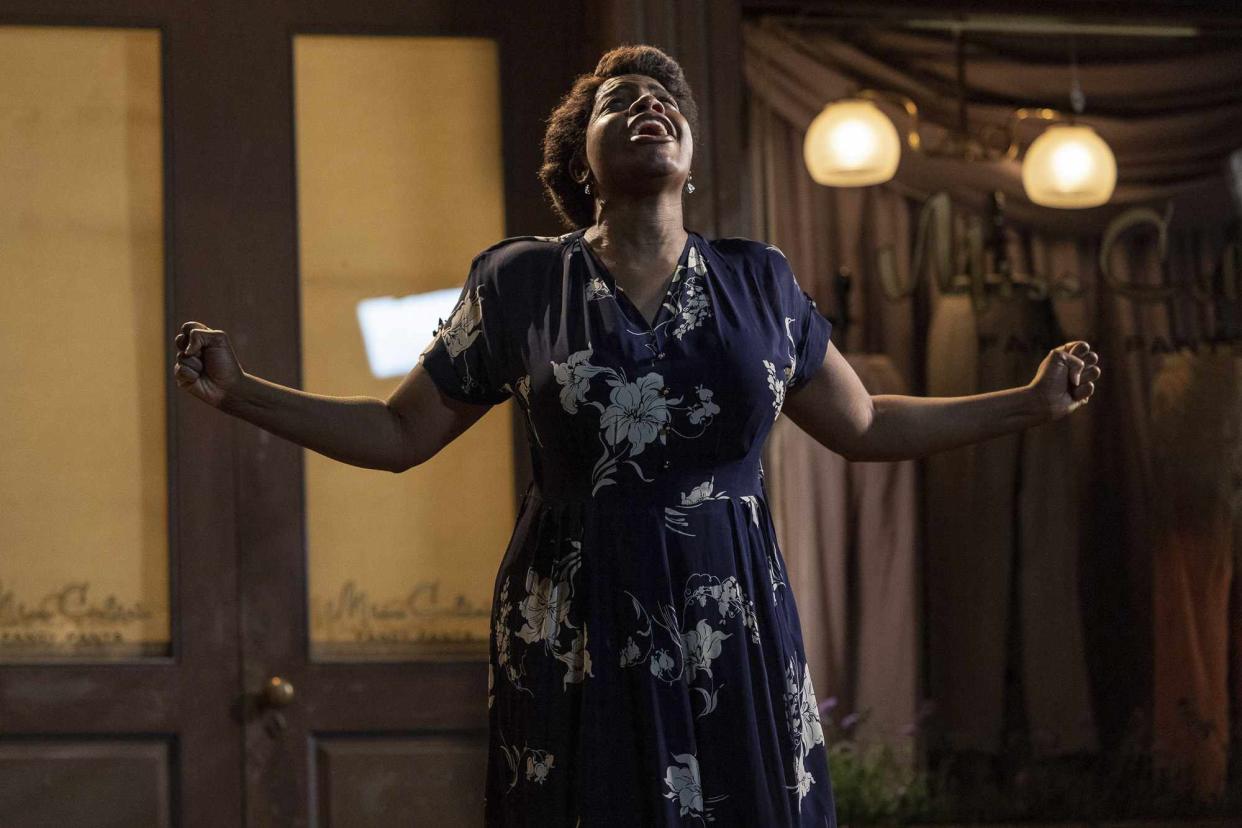
- Oops!Something went wrong.Please try again later.
- Oops!Something went wrong.Please try again later.
- Oops!Something went wrong.Please try again later.
Though the film is bursting with incredible performances, anchored by Barrino's Celie, it never really sings.
If one can name a definitive literary classic of the late 20th century, The Color Purple is surely in contention.
The 1982 Alice Walker novel became a celebrated Steven Spielberg film in 1985, introducing the world to Whoopi Goldberg and earning Oprah Winfrey an Oscar nomination for Best Supporting Actress. Since then, the tale has gone on to be reinvented on the stage as a musical, earning 11 Tony nominations in 2006 and spawning a hit 2015 revival.
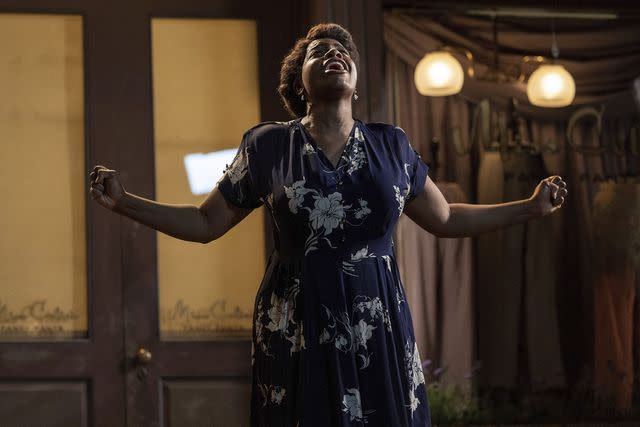
Everett Collection
Fantasia Barrino in 'The Color Purple'Now, in what seems to be an increasingly popular pipeline of book to movie to musical to movie musical, The Color Purple gets a vibrant reimagining on screen. Fantasia Barrino (American Idol), who earned raves taking over for LaChanze in the original Broadway production, returns to the role of Celie, a woman who endures decades of abuse as she struggles to find her voice and longs for her beloved sister, Nettie (Halle Bailey/Ciara). If there’s no other reason for this movie to exist, permanently capturing Barrino’s performance is sufficient.
Barrino is both meek and powerful as Celie, a woman who silently endures her husband Mister’s abuse and tyrannical rule of their household until jazz singer Shug Avery (Taraji P. Henson) opens her eyes to the possibilities of a life filled with love. Celie is a woman of few words, but Barrino’s soulful eyes tell us everything we need to know about what’s going on inside her head. Of course, what is a musical without an inner monologue voiced in song? Barrino nails that aspect of the role as well. Her shatteringly powerful instrument that won her the third season of American Idol has matured and ripened over the years, allowing her to lean into and luxuriate in her vocal riffs.
It’s frustrating, then, that film is perhaps not the best medium for these numbers, particularly her 11 o’clock showstopper, “I’m Here.” The refined studio recording can’t match the timbre or electric energy of hearing that number delivered live, instead introducing an element of restraint to the vocals that belies the emotional catharsis of the moment.
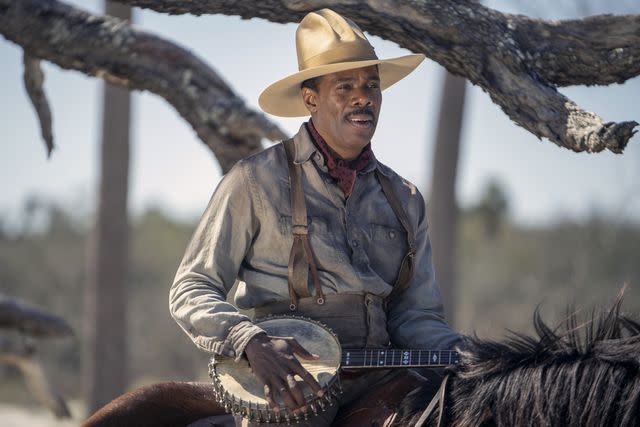
Everett Collection
Colman Domingo in 'The Color Purple'It is the performances, not the musical numbers, that make The Color Purple sing. While Barrino is the film’s fulcrum, a cast of characters surround her gentle introvert. Colman Domingo continues to prove himself one of the best in the business with his take on Mister, a man perpetuating the cycle of abuse he never managed to escape. He portrays Mister as a wounded animal, a feral, vicious creature who lashes out with his own pain.
Henson delivers a performance that is vitally alive in her portrayal of blues artist Shug Avery, a woman whose entire being is designed to suck the marrow out of life. Henson’s “Push Da Button,” a sexy, sensual, speakeasy ditty that finds her climbing atop tables and crooning the virtues of pleasure, is an arresting feast for the senses and a hell of a good time.
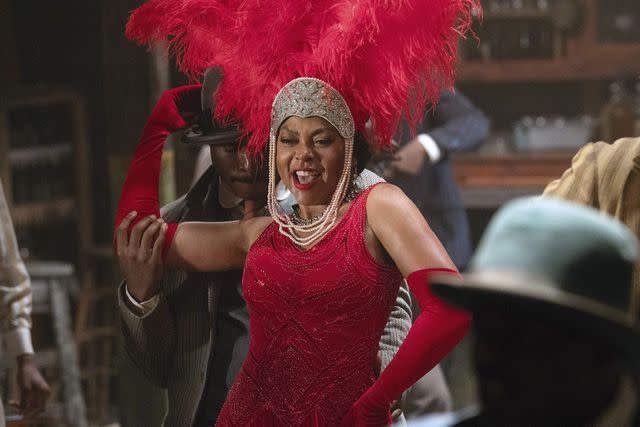
Everett Collection
Taraji P. Henson in 'The Color Purple'But of the supporting players, it’s Danielle Brooks who shines brightest as Sofia, the role that Oprah originated in the 1985 film. Brooks’s Sofia is a barreling, boisterous woman, one who knows her own value and refuses to accept any less, as testified in the song "Hell No!." But the true power of Brooks’ performance is how she navigates Sofia’s journey from that of a woman with a lust for life to a shattered spirit and back again. To see her contagious laugh silenced and her sparkling eyes downcast speaks volumes more about domestic violence, racism, and the trauma of the prison industrial complex than any dialogue ever could.
Sofia is in many ways the juiciest role in The Color Purple, and Brooks bites into it with abandon while never seeking to set herself apart from the ensemble. It’s a performance that is both showy and restrained, a master class in acting. It's also worth mentioning her counterpoint, Corey Hawkins, as Sofia's first husband, Harpo, who is one of cinema (and movie musicals) most valuable utility players working today.
Despite its panoply of outstanding performances, The Color Purple can’t weave together a tapestry as lush or impressive as any one of its actors' work. Its musical numbers don’t feel essential to the storytelling (nor is it a particularly striking score). Director Blitz Bazawule, best known for directing Beyoncé's Black Is King visual album, would seem a natural fit for a musical. His strengths are on full display when the numbers are integrated into the world of the characters, the swing of a hammer or a pick-ax lending a song its rhythm, the wooden planks of a storefront or the bar of a swampy juke joint becoming a dance floor.
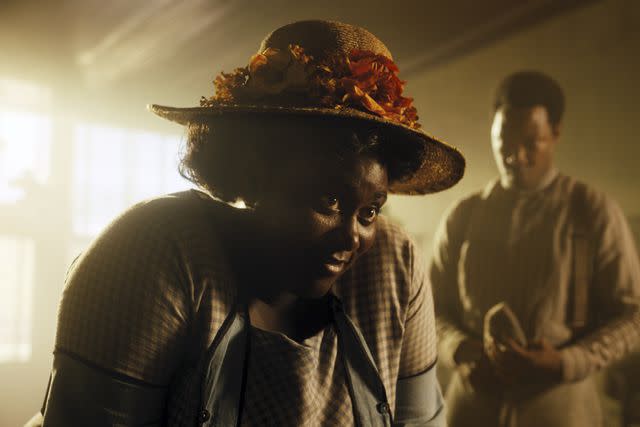
Everett Collection
Danielle Brooks in 'The Color Purple'Yet too often the film strives to make something overly cinematic, turning Shug’s bath into the center of a rotating record or transporting Celie and Shug to an Astaire and Rogers worthy ballroom. In theory, it’s a lovely visualization of Celie’s rich imagination, but in practice, it’s a jarring distraction, taking the audience out of the action. Perhaps in part because the film can’t make up its mind as to whether its characters' tendency to break out into song is real or imagined. It lacks a decisive point of view when it comes to its genre trappings.
Bazawule, as well as screenwriter Marcus Gardley and book writer Marsha Norman, reframes the narrative here around Celie’s journey to self-love. The 1985 film focuses more wholly on themes of family and reunion (not surprising from Steven Spielberg), while this musical adaptation turns its focus instead to a moving portrayal of how one woman finds her voice.
Yet, in spite of that welcome reframing, something doesn’t gel; whether it’s the erratic pacing of a story that spans decades or its wildly fluctuating tone, the movie never finds its center. It lands its tear-jerking finale, but many moments that should be emotionally devastating or cathartic instead ring hollow. With stellar performances and the foundation of a beloved novel, The Color Purple should be as lush and beautiful as its titular hue. Instead, it’s just… here. Grade: B
Want more movie news? Sign up for Entertainment Weekly's free newsletter to get the latest trailers, celebrity interviews, film reviews, and more.
Related content:
Oprah Winfrey says there was pressure to cast Beyoncé or Rihanna in The Color Purple
How Fantasia injected new life into The Color Purple: 'I got to do it one more time'
Oprah Winfrey says Tina Turner turned down a role in The Color Purple
Read the original article on Entertainment Weekly.

